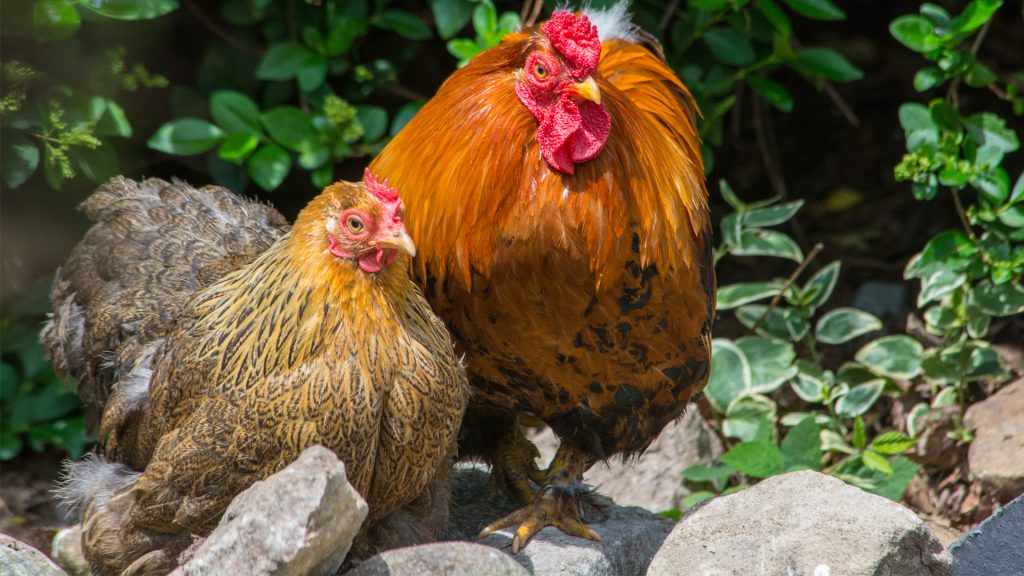Avian Influenza: birdkeepers asked to remain vigilant in light of recent outbreaks
Shropshire Council’s regulatory services team are urging birdkeepers to remain vigilant in light of the recent outbreaks of Avian Influenza in neighbouring counties Cheshire and Herefordshire.

Chickens outside in garden
Avian Influenza (bird flu) is a notifiable animal disease that mainly affects birds, but it can also affect humans and other mammals.
Whilst there are currently no cases in Shropshire, animal health officers are asking birdkeepers, including domestic and commercial keepers, to check stock regularly for signs of Avian Influenza, and also to register their stock in case contact needs to be made.
Public Health England advises that the risk to the public’s health is very low, and the Food Standards Agency (FSA) has said that on the basis of the current scientific evidence, avian influenzas pose a very low food safety risk for UK consumers.
Signs of bird flu
Highly pathogenic avian influenza (HPAI) is the more serious type. It is often fatal in birds. The main clinical signs of HPAI in birds are:
- swollen head
- blue discoloration of neck and throat
- loss of appetite
- respiratory distress such as gaping beak, coughing, sneezing, gurgling, rattling
- diarrhoea
- fewer eggs laid
- increased mortality
Clinical signs can vary between species of bird and some species (for example ducks and geese) may show minimal clinical signs.
Advice
If you suspect any type of bird flu in poultry or captive birds you must report it immediately by calling the Defra Rural Services Helpline on 03000 200 301. In Wales, contact 0300 303 8268.
If you find dead wild waterfowl (swans, geese or ducks) or other dead wild birds, such as gulls or birds of prey, you should report them to the Defra helpline (03459 33 55 77 – please select option 7).
If you keep poultry, whether commercially on a farm, or as pets in your garden, or rearing game birds, you should keep a close watch on them for signs of disease and maintain good biosecurity at all times. If you have any concerns about the health of your poultry, seek prompt advice from your vet.
You should register your poultry, even if only kept as pets, so you can be contacted during an outbreak. This is a legal requirement if you have 50 or more birds.
Good biosecurity improves the overall health and productivity of your flock by helping keep out poultry diseases such as avian influenza and limiting the spread of disease in an outbreak.
To ensure good biosecurity, all poultry keepers should:
- minimise movement in and out of bird enclosures
- clean footwear before and after visiting birds, using a Defra-approved disinfectant at entrances and exits
- clean and disinfect vehicles and equipment that have come into contact with poultry
- keep areas where birds live clean and tidy, and regularly disinfect hard surfaces such as paths and walkways
- humanely control rats and mice
- place birds’ food and water in fully enclosed areas protected from wild birds, and remove any spilled feed regularly
- avoid keeping ducks and geese with other poultry species, where possible
- keep birds separate from wildlife and wild waterfowl by putting suitable fencing around outdoor areas they access
- keep a close watch on birds for any signs of disease and report any very sick birds or unexplained deaths to your vet.
Gwilym Butler, Shropshire Council’s Cabinet member for communities, place planning and regulatory services, said:
“Following the news of bird flu cases in neighbouring counties, I strongly encourage all birdkeepers to stay alert, but not be alarmed.
“Our regulatory services have robust plans and procedures in place for dealing with an avian influenza outbreak, should one occur in Shropshire.
“Do keep an eye out for any signs of bird disease and, if found, please report it immediately.
“Also please follow the latest guidance and ensure you have good biosecurity practices in place, especially as bird migration season is currently underway.”
Register your birds
We encourage all keepers to register their birds with us so we can contact you quickly if there is a disease outbreak in your area and you need to take action.
If you have more than 50 birds, you are legally required to register your flock within one month of their arrival at your premises. If you have less than 50 birds, including pet birds, you should still register.
https://www.gov.uk/government/publications/poultry-including-game-birds-registration-rules-and-forms

